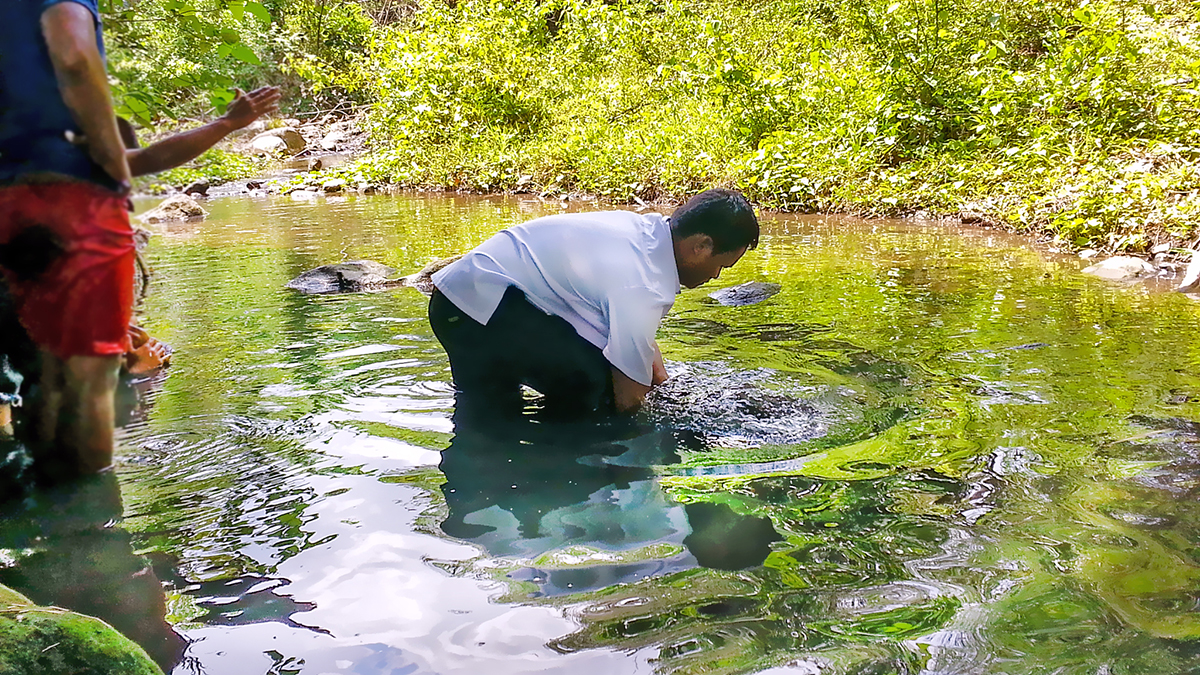

by Danny Linden
Synopsis: Baptism is more than a ceremony or rite—instead, it is a crucial part of salvation that should be completed urgently instead of delayed or scheduled.
Baptism is a critical part of God's plan of salvation. It is the moment that we come into contact with the blood of Christ and have our sins washed away. As such, we would expect to see baptism in Scripture performed with urgency. By studying the examples of conversion in Acts that demonstrate this urgency, even in inconvenient times, we can understand how we ought to choose when to be baptized.
In Acts 2, Peter preaches a message that is quite disturbing to those in the crowd. He proves that Jesus of Nazareth is the Messiah who was prophesied in Scripture. He was not the type of Messiah that they expected. Christ is not merely a king in a long line of kings from David's lineage. Instead, He is the Son of God, King of kings and Lord of lords.
Of course, this was more than an academic point to his audience. They were responsible for the crucifixion of Jesus, which made them guilty of an unthinkable sin. With that realization, they were convicted in their hearts and asked Peter and the other apostles what, if anything, could be done to fix it. We know that God is a God of mercy and grace who desires to save us (cf. Eph. 2:4ff). Yet, Peter answers their question not with simple reassurance but with a command: "Repent and be baptized every one of you in the name of Jesus Christ for the forgiveness of your sins, and you will receive the gift of the Holy Spirit. For the promise is for you and for your children and for all who are far off, everyone whom the Lord our God calls to himself" (Acts 2:38-39). God's grace and our faithful response are inextricably tied together and necessary for us to be saved.
Finally, we see the urgent desire of these people to be baptized. Three thousand people were baptized that same day. They did not wait for a future day, and there were so many potential reasons to wait. Pentecost was an important religious holiday, so it was already a day on which those assembled would already have plans. Additionally, trying to get 3000 people to do anything swiftly or efficiently is not easy. Yet, baptism was essential enough not to wait.
Acts 16 gives us another example of conversion under extraordinary circumstances. Paul and Silas traveled to Philippi, preached the gospel, and then were beaten and jailed by an angry mob. From their prison cell, they prayed and sang to God. Late in the night, a miraculous earthquake opened the doors and released every prisoner from his chains. Seeing this, the jailer despaired, ready to take his own life for fear of the consequences of failing his job. However, Paul called out to him, revealing that they were all still there. The jailer realized there was something miraculous about these events and now feared that the God they had preached was true and that he was God's enemy. Paul and Silas gave him the good news: "Believe in the Lord Jesus, and you will be saved, you and your household" (Acts 16:31). Of course, this was hardly the end of the conversation. They still needed to explain to him who Jesus was and what He requires (v. 32). After hearing these things, he and his family were convicted and were baptized that same hour of the night (v. 33).
Consider the urgency the jailer and his family must have felt for events to unfold this way. It was late at night, and he had already been asleep. If Paul's message was that God had already saved him by grace, he could relax and go back to sleep, content to learn more about his next steps in the morning or whatever day was convenient. How often do we complete unimportant or time-insensitive tasks late at night? Nevertheless, the jailer knew that his problem was not solved until he was baptized, so he did not delay. Also, Paul and Silas were in rough shape after being beaten. Their untreated wounds had been left to fester and ooze as they sat in their cell. They must have been exhausted, but the trauma and pain kept them awake. However, even after finally having their wounds cleaned and treated, they did not ask to rest, nor did the jailer offer. The jailer and his family needed salvation, and that would not happen without baptism. This is a spiritual emergency, not a simple ceremony.
The Ethiopian eunuch in chapter 8 is another excellent example. He read from Isaiah but did not understand what he read until Philip explained it to him and "told him the good news about Jesus" (Acts 8:35). Even though he is on a long journey and between towns, his need for baptism was so urgent that he was baptized at the next pool of water they found! Though he could have waited until he got home to be with his family and friends, the Ethiopian could not allow himself to be estranged from God any longer.
One of my favorite questions to ask in the book of Acts is, "When did they rejoice?" It's a question that can be asked with every conversion story, and it is quite revealing. Each conversion story has something significant in common: Through the preaching of the gospel, people realize that they are lost in sin and need to be saved. They learn of God's grace and Jesus' sacrifice, and then they learn what response is required on their part. Only after being baptized do we see relief and joy. Take Saul's conversion from Acts 9 as an example. As he traveled to Damascus, he saw a vision of the Lord. That is a truly wonderful and miraculous thing, yet he did not rejoice. Instead, he is troubled and didn't eat or drink for three days, having been struck blind. Even after Ananias restores his sight, Saul does not regain his strength and eat and drink again until after he was baptized. Saul's sorrow remained until his sins were washed away. This is not unique to Saul's story. It can be a useful exercise to study the conversion accounts and note when the change in emotion takes place.
Despite this focus on the urgency of baptism, a necessary follow-up consideration is whether a person can be baptized too early. We have no examples of that in Scripture, but there are specific prerequisites to baptism. As we teach others, our goal is to make disciples, not merely baptize (Matt. 28:19-20).
A singular focus on baptism inevitably turns it into a religious rite and ignores its meaning and place within God's extension of grace to mankind. Baptism marks the beginning of a new way of life (Rom. 6:4). This new life needs to be considered carefully. Following Jesus is a commitment. Our Lord wants us to count the cost before becoming His disciple:
Whoever does not bear his own cross and come after me cannot be my disciple. For which of you, desiring to build a tower, does not first sit down and count the cost, whether he has enough to complete it?. .. So therefore, any one of you who does not renounce all that he has cannot be my disciple (Luke 14:27-28, 33).
Baptism should not take place until a person has considered these things and made the choice to serve Jesus. There is no qualification test or anything like that, and it is not even really the role of a preacher or elder to decide whether one is worthy of baptism. It is an individual choice that must be made with careful consideration of the cost of serving Jesus, along with the rewards that await us. With the proper understanding of the stakes, the choice should be clear.
When should I be baptized? It is an urgent matter. When I understand that my sin has separated me from God, and when I have learned what God has done for me and what He requires of me, I should be baptized as soon as possible. It makes no sense for one to wait for a special day, or any other convenient or symbolic time.
Author Bio: Danny has worked with the Santee Church of Christ in Santee, CA, since November 2019. He and his wife, Lauren, have two children and are expecting their third. The church website is santeechurchofchrist.org. He can be reached at danny@dannylinden.com.

Image: Baptism in a remote jungle stream of Kalinga Province
